These Emails Show The Government Was Repeatedly Warned Before An Asylum Seeker’s Death
--
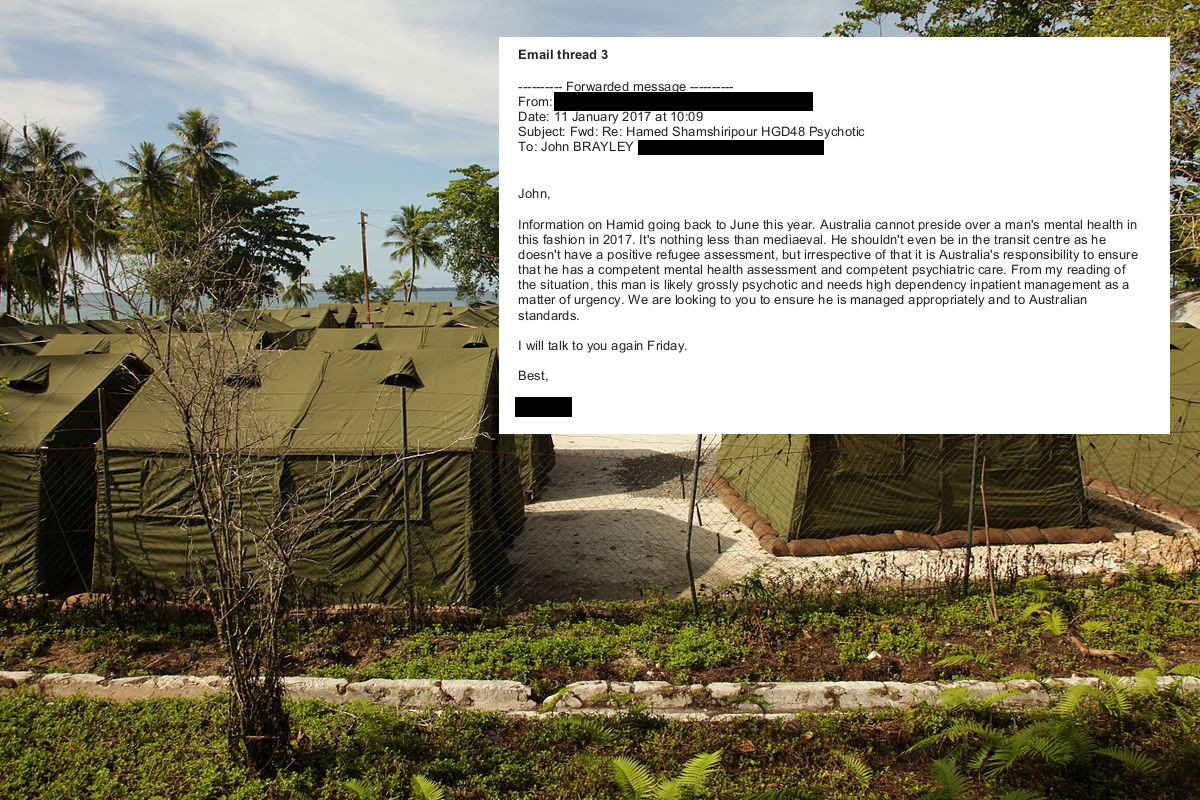
The Australian government was repeatedly warned by doctors and refugee advocates that an asylum seeker who died on Manus Island this week was in grave danger.
Emails provided to Junkee show the Australian Border Force’s Chief Medical Officer, Dr John Brayley, was told directly in June 2016 that Iranian man Hamed Shamshiripour’s mental health was deteriorating rapidly and that there were significant fears for his health and safety.
Hamed’s body was found earlier this week by fellow detainees, following an apparent suicide, although some refugees and advocates suspect foul play.
Refugee advocates have told Junkee that in the months and years leading up to his death, Hamed exhibited increasingly erratic and dangerous behaviour, including talking loudly to himself, removing his clothes in public, urinating on himself and self-harming.
As a result of this, he was a frequent target of violence from PNG locals.
Now, a timeline showing the Australian government was warned repeatedly about Hamed’s deteriorating health can be revealed.
Death of an asylum seeker.
Hamed arrived on Manus Island in August 2013, keen to help out his fellow asylum seekers and volunteer in the detention centre’s canteen and classroom, but within months, his mental health began deteriorating, according to documents published this week by BuzzFeed.
On June 15 last year, Pamela Curr from the Asylum Seeker Resource Centre emailed the Australian Border Force’s Chief Medical Officer, Dr John Brayley, informing him of a “young man on Manus who has gone mad and who is now in a PNG prison.”
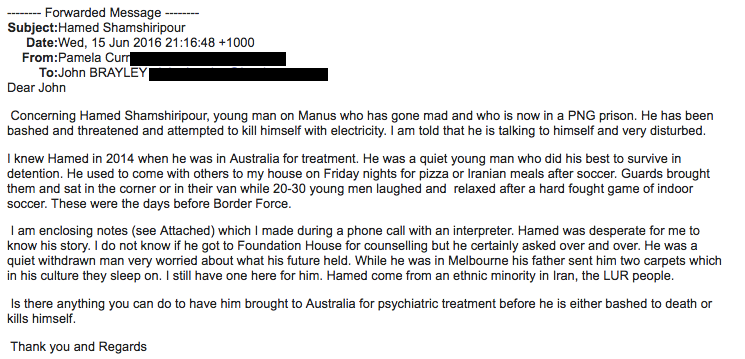
According to Curr, Hamed’s mental health worsened following the death of fellow asylum seeker Reza Berati, who was bashed to death during a riot on Manus Island in February 2014. Hamed was a friend of Berati’s and was deeply affected by the violence that led to Berati’s death.
Curr’s email to Brayley outlined Hamed’s “disturbed” behaviour and repeated attempts to kill himself as well as alleged threats to his safety from PNG locals. Curr said she had spoken to Hamed through an interpreter. During the conversation, Hamed spoke of recurring nightmares in which seven men emerged from beneath his bed to beat him every night.
Curr concluded the email by asking Brayley to bring Hamed to Australia for psychiatric treatment “before he is either bashed to death or kills himself.”
On the same day, another refugee activist who was in close contact with Hamed’s friends on Manus, Margaret Sinclair, emailed Brayley to inform him of Hamed’s “psychotic” behaviour.
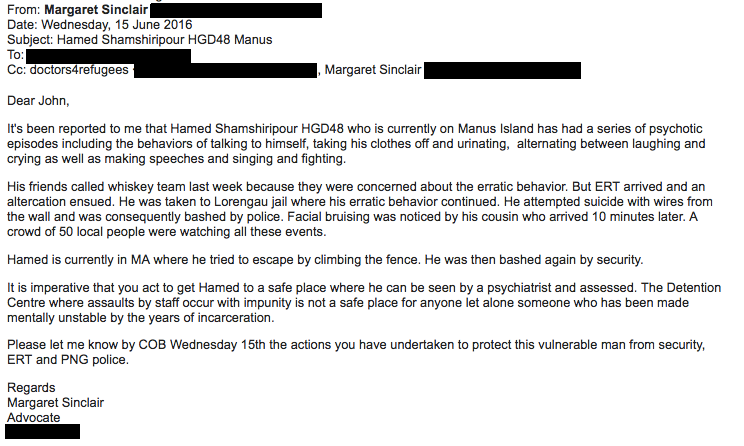
“It’s been reported to me that Hamed Shamshiripour HGD48 who is currently on Manus Island has had a series of psychotic episodes including the behaviors [sic] of talking to himself, taking his clothes off and urinating, alternating between laughing and crying as well as making speeches and singing and fighting,” the email read.
Sinclair said Hamed had been moved from the Lorengau refugee transit centre to the local jail following an altercation with guards. Sinclair said Hamed had attempted suicide in the jail and was bashed by guards as a result. Within ten minutes, Hamed was seen with bruising on his face, according to the email.
“It is imperative that you act to get Hamed to a safe place where he can be seen by a psychiatrist and assessed. The Detention Centre where assaults by staff occur with impunity is not a safe place for anyone let alone someone who has been made mentally unstable by the years of incarceration,” the email to Brayley stated.
Fourteen of Hamed’s fellow detainees signed a letter of complaint about Hamed’s detention, saying he was not being given adequate care, according to The Guardian.
In early August 2016, Sinclair emailed again asking for more information on Hamed’s care and expressed concern that Hamed would be released back into the Lorengau transit centre, where he would not receive adequate care.
Copied on the email was Sinclair’s local MP, the Liberal federal member for La Trobe, Jason Wood.
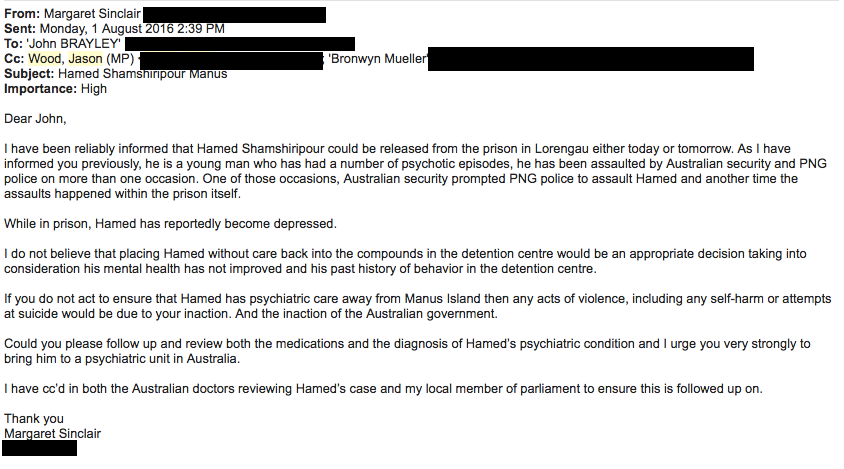
“I do not believe that placing Hamed without care back into the compounds in the detention centre would be an appropriate decision taking into consideration his mental health has not improved and his past history of behavior in the detention centre,” Sinclair told Brayley.
“If you do not act to ensure that Hamed has psychiatric care away from Manus Island then any acts of violence, including any self-harm or attempts at suicide would be due to your inaction. And the inaction of the Australian government.”
Ten days later, a representative from the Department of Immigration and Border Protection [DIPB] emailed Sinclair, saying Hamed had been included on a list of asylum seekers that Brayley was “actively following”. In an email to Sinclair, Brayley said he was seeking more information on Hamed’s wellbeing.
At the same time, Brayley was receiving emails from Doctors4Refugees, a volunteer coalition of Australian doctors, who provide assessments of refugees and asylum seekers who have been detained as part of Australia’s off-shore detention system.
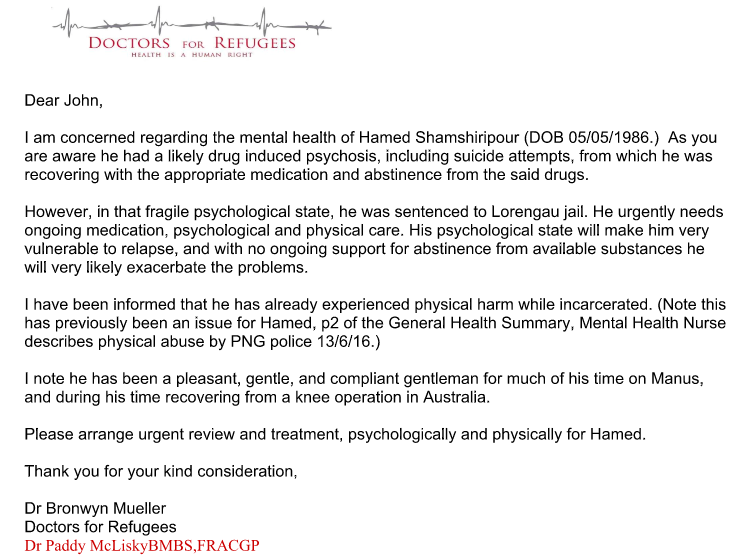
“I am concerned regarding the mental health of Hamed Shamshiripour,” Dr Paddy McLisky wrote to Brayley on August 6, 2016. “As you are aware he had a likely drug induced psychosis, including suicide attempts, from which he was recovering with the appropriate medication and abstinence from the said drugs.”
“However, in that fragile psychological state, he was sentenced to Lorengau jail. He urgently needs ongoing medication, psychological and physical care. His psychological state will make him very vulnerable to relapse, and with no ongoing support for abstinence from available substances he will very likely exacerbate the problems.
“I have been informed that he has already experienced physical harm while incarcerated.”
On November 1, 2016, Margaret Sinclair made a submission to the senate inquiry into serious allegations of abuse, self-harm and neglect of asylum seekers on Manus Island and Nauru. Attached to the submissions were screenshots of text message conversations between Sinclair and a friend of Hamed’s on Manus Island.
The texts were not published by the Senate inquiry due to privacy concerns, but have been seen by Junkee.
In the texts, Hamed was described as behaving erratically and talking to himself, acting like he was drunk even though he wasn’t, talking and singing loudly and getting into fights.
“Sometimes around midnight he was yelling out and talking to God as some friends say, he took all his clothes off and pee [sic],” one text stated.
“I am sure he doesn’t have any control of whatever he does,” another text read.
Hamed’s friend told Sinclair that Hamed had been arrested because of his erratic behaviour and violence. The friend claimed that PNG police had beaten Hamed while he was in custody.
“It was a big fucking shock,” the friend wrote. “He [Hamed] was crying and laughing.”
On January 10 this year, The Guardian published a story about Hamed, saying he had been found wandering the streets of Lorengau “half-naked, hungry and homeless” following an acute mental breakdown.
A day later, another doctor from Doctors4Refugees emailed Brayley, describing Hamed’s care as “medieval”.
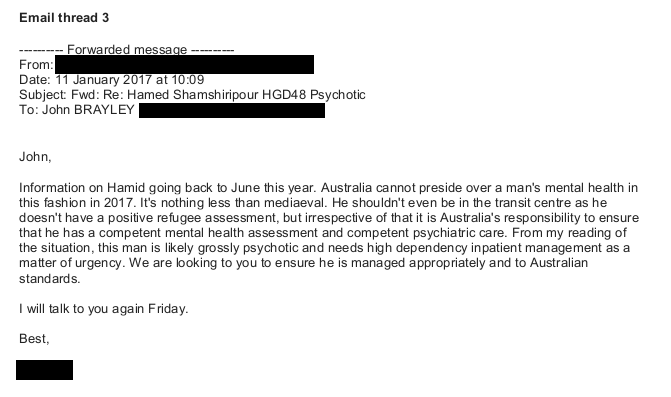
“Australia cannot preside over a man’s mental health in this fashion in 2017,” the doctor, who has asked not to be identified, wrote to Brayley
“From my reading of the situation, this man is likely grossly psychotic and needs high dependency inpatient management as a matter of urgency. We are looking to you to ensure he is managed appropriately and to Australian standards.”
The same day, Brayley was copied on an email circulated to the Doctors4Refugees executive, in which Hamed was described as “a ticking time bomb ready to explode”.
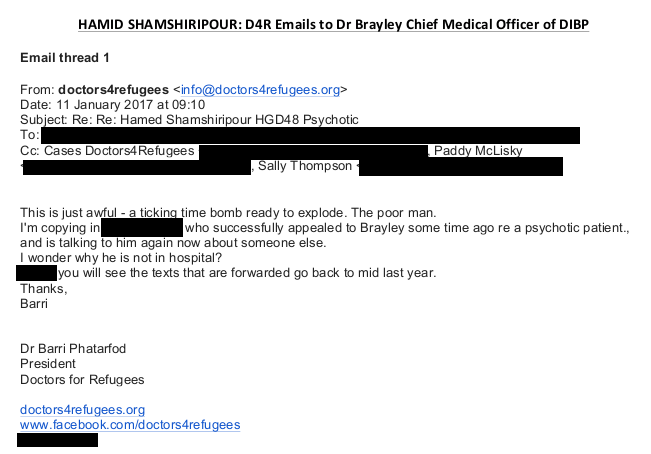
Shortly after, the doctor and Brayley had a phone conversation.
“I told John [Brayley] that unless Hamed was properly looked after he would end up dead by murder or suicide,” the doctor told Junkee. “To say that the requests were not met with the proper urgency would be an understatement.”
The doctor described dealing with the Australian government on issues such as these as a mess of bureaucratic delay.
“It’s like pushing water uphill,” the doctor said.
Doctors4Refugees say they did not receive a response from the government until two months later, when they were told that “no significant mental health concerns have been raised [for Hamed] since the 13th of January.”
Doctors4Refugees say that was the last information they received about Hamed from the government.
In February and March this year, Margaret Sinclair sent emails to Comcare, the government agency charged with overseeing the health and safety of refugees and asylum seekers detained in Australia’s off-shore detention network.
The emails outlined ongoing concerns for Hamed’s mental health and lack of care.
“Mr Shamshiripour is still displaying psychotic behaviours such as spending the whole night walking around talking to himself and still occasionally fighting with the other residents,” one read.
On Monday, Hamed’s body was found in the forest not far from the Lorengau transit centre. Local police have said his death appears to be suicide, but fellow refugees and refugee advocates have not ruled out foul play, saying Hamed’s body had signs of injuries that are not consistent with suicide.
Hamed’s family, as well as the Australians Greens refugee spokesperson Nick Mckim, have called for an independent autopsy to be conducted in Australia.
“Hamed was Australia’s prisoner, and it is the Australian government’s responsibility to determine exactly how he died,” Mckim said in a statement this week.
“Unfortunately, Hamed’s death has shown how volatile and desperate the situation is in Australia’s offshore detention centres. As the UNHCR has warned, the Australian government’s actions are exacerbating the crisis on Manus Island.”
When contacted directly by Junkee, John Brayley referred all questions to the immigration department’s media operation. The department of immigration declined to comment accept to confirm that a death occurred in the Lorengau township.
“PNG authorities are investigating the matter,” the department said.
—
If you need to talk to someone, call Lifeline on 13 11 14 or Beyond Blue on 1300 224 636.